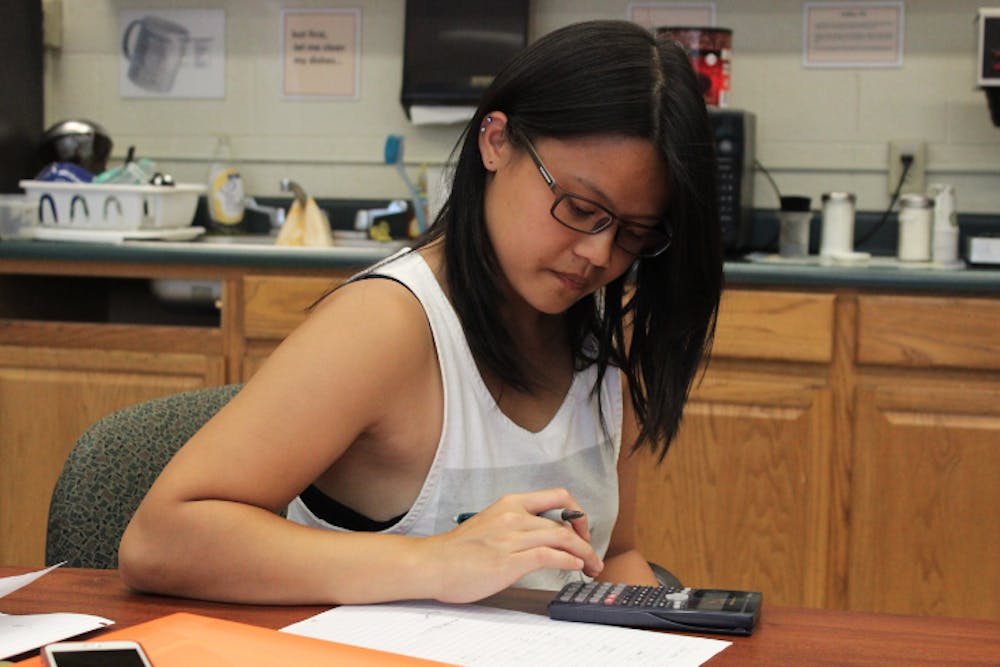Mami, milo and apollo are just some of the non-perishable Malaysian food Ashley Chong brought with her after a 30-hour flight to the United States.
Chong, a sophomore from Malaysia studying forensic chemistry, came to the United States under a two-year transfer program.
In Malaysia, she went to a private institution named Sunway University and enrolled in a four-year program called the American Degree Transfer Program. The program allows her to spend two years in the U.S.
“I just thought, ‘you know, just do it,’” Chong said. “If you think (something is) interesting and it scares you a little bit, just do it. It’s probably the right choice.”
Many first-time international students learn to adjust to American culture and the educational system during their first couple of weeks at Ohio University.
In Fall 2015, more than 1,700 international students, both
Chong is from the middle of the Malaysian capital Kuala Lumpur, which she describes as a large city with terrible traffic. She said Athens is a nice, small town, and she would consider moving to the city with her mother.
In between completing assignments for her chemistry, physics and biology classes, Chong started to play for the Women’s Ultimate Frisbee team to add balance to her schedule.
“Sports (are) a must,” Chong said. “You need to have sports. You can’t be studying 24/7 and going for classes 24/7. I like a balance. I think a balance is really important because you’re going to lose interest in something if you don’t have balance.”
Chong said she wants to join more organizations, but her classes are much more rigorous than her Malaysian classes and she is still adjusting to the American educational system.
“I just think I need more time to actually incorporate other activities into my daily routine, once I feel more settled in,” Chong said. “I just feel like assignments are taking over my life right now.”
Chong said education in the U.S. is very different from Malaysia. Classes at OU rely more on software and technology, such as Connect and Launchpad, to which she said she is still adjusting, whereas in Malaysia assignments are all on paper. Another difference is how textbooks are much more expensive in the U.S. also, Chong said.
“For every subject, you have to use some sort of online portal to turn in assignments, which is something I’m trying to get used to,” Chong said.
Chong said she appreciates the freedom of speech Americans
“Malaysia is not as developed as the U.S., especially not mentally,” Chong said. “It’s just easy to offend people there.”
Chong also said OU professors are more helpful than those in Malaysia because they encourage students to ask questions and attend office hours. She said overall, the university is more “about the students” than her school in Malaysia.
Because of the new environment and teaching methods, Chong said she feels more stressed at OU. In Malaysia, Chong’s classes were normally one to two hours long. With some classes being only 55 minutes at OU, Chong said they are more jam-packed with information.
“You really have to focus," Chong said. “There’s no room for you to zone out and dream.”
Nitin Luthra, a first-year graduate student from India studying English, said OU exceeded his expectations about academics.
Luthra said OU is a lot more professional and rigorous than he expected, and he said the students are very focused and academically-oriented.
“The reason for that could be (the U.S. is) a developed country,” Luthra said. “India has the problem of numbers. That’s why it’s not as organized there.”
As a graduate student, Luthra said he hasn’t had a lot of time to go out on the weekends. He said he has to work rigorously throughout the week in order to make time on Fridays and Saturdays.
“The hardest part is you feel lonely at times,” Luthra said. “You want to just try and connect with people. You want to meet more people. That’s difficult. Perhaps not for everybody, but certainly for me.”
Compared to the educational shock Chong feels, Chong said she did not experience much of a culture shock. Television shows like Grey’s Anatomy prepared her well for what U.S. was like, which she said accurately depicted American culture.
Although she was not surprised by American culture, Chong said she thinks it is harder for international students than American students to make friends because of an unconscious “invisible barrier” that comes between American and international students as a result of their cultural differences.
Chong found small talk is an important part
Hashim Pashtun, the president of International Student Union, said domestic students should help international students who are adjusting to American customs.
“The small request I have from domestic students is don’t judge them and don’t be offended if they do something wrong," Pashtun said. “Try to help them. Try to get to know them, and don’t expect American tradition or culture from them. Don’t be hurt and don’t feel offended.”
Swati Roy, an international student from Bangladesh who enrolled in OU last year, said she struggled with homesickness her first semester. She said the adjustment international students make can be difficult, but it ultimately gets easier.
“To the new international students, I’d just say, ‘hang in there,’ ” Roy, a sophomore studying international business, said. “Your first year might feel a little bumpy, you might feel a little intimidated, but concentrate on your studies and just try to be friendly to people.”
It’s still too early to tell, Chong said, but she thinks Athens is starting to feel like home.
“It’s home because I like the community here. It’s really small and people are very friendly,” Chong said. “It feels like home-ish. It’s close.”






